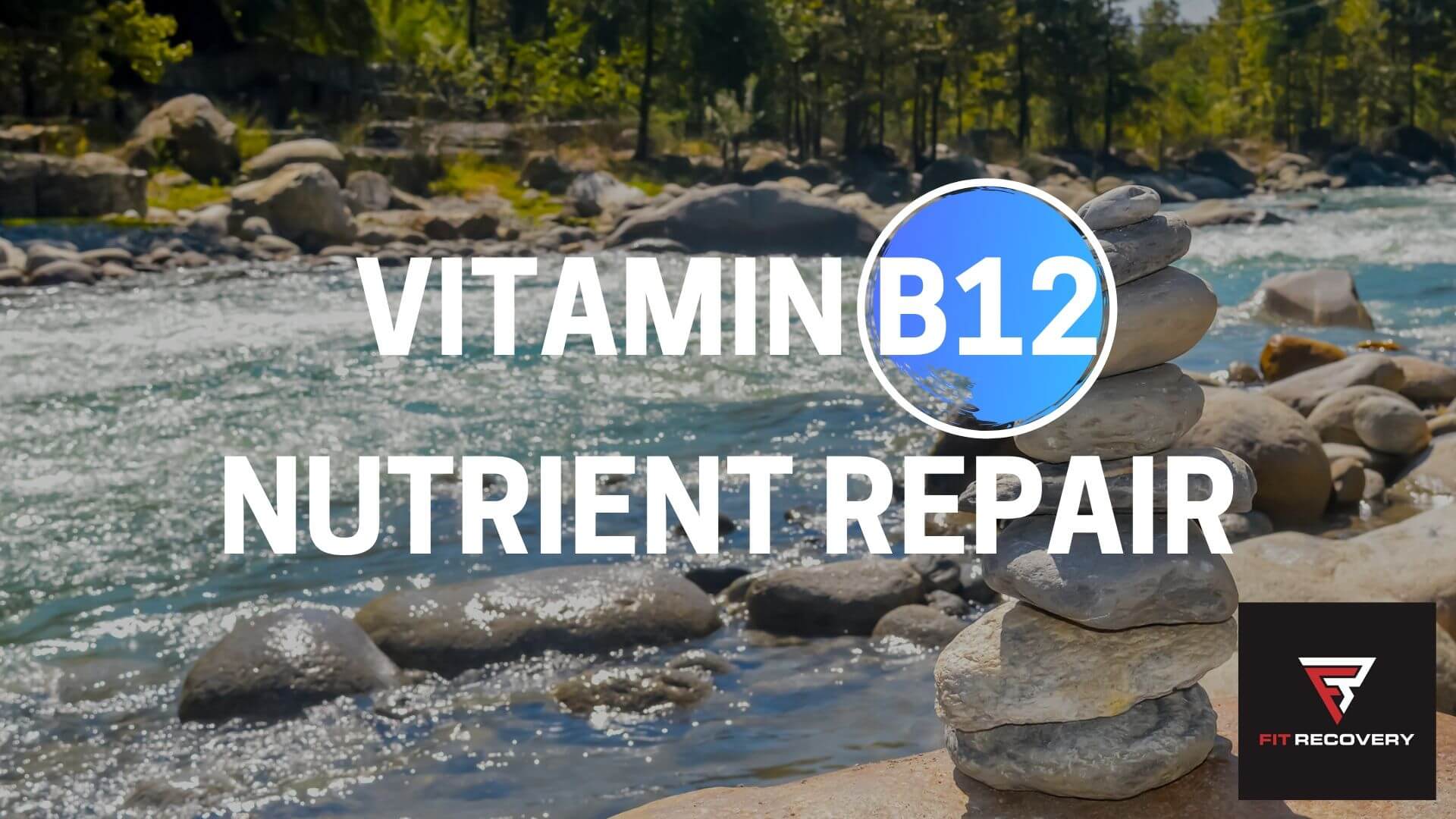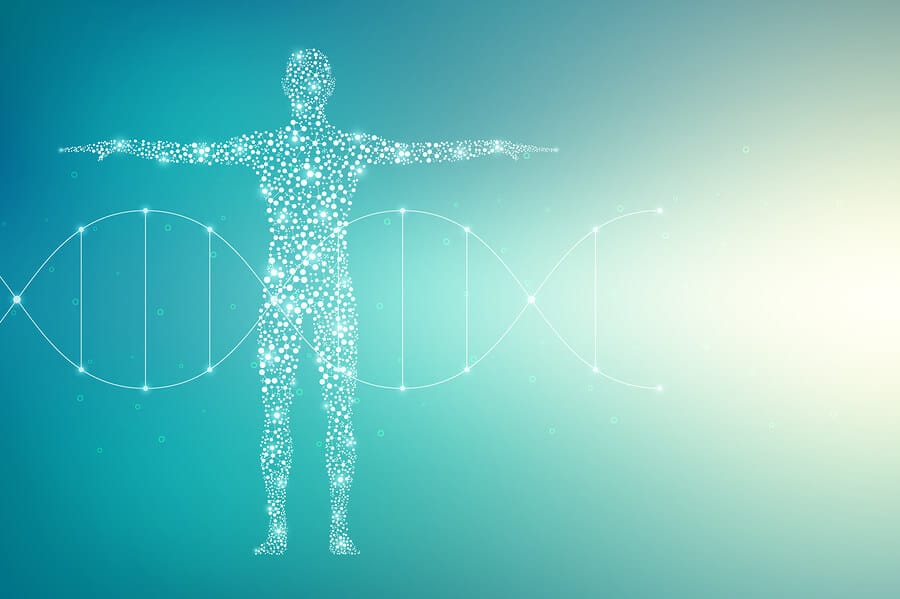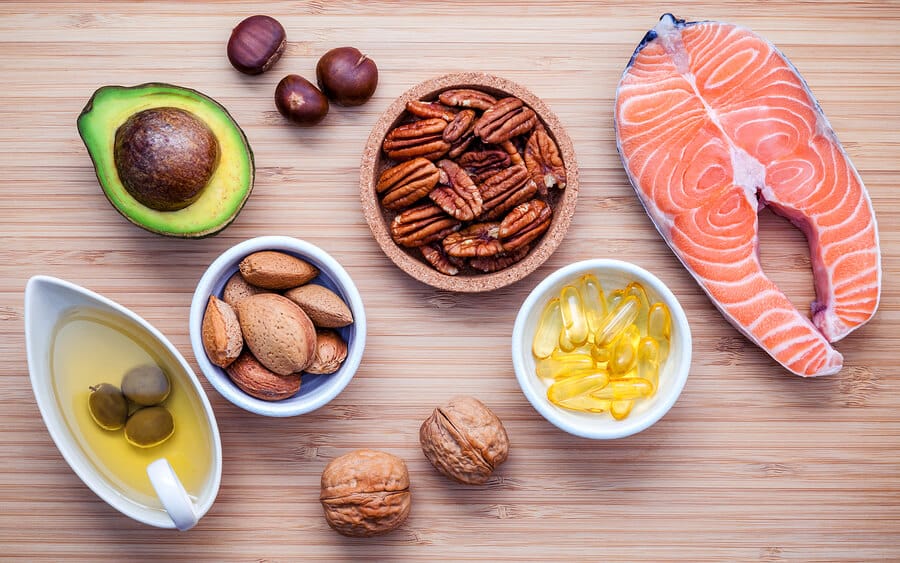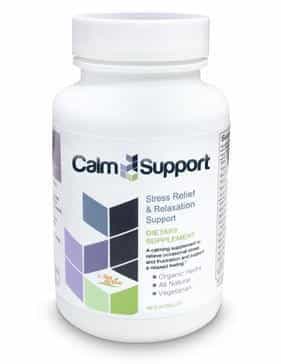The relationship between vitamin B12 and alcohol is well known, especially since prolonged drinking severely depletes stores of this vitamin. This article will discuss the importance of vitamin B12, the symptoms of deficiency, and how to repair this deficiency while covering other nutritional bases as well.

This is one of a series of articles on Fit Recovery about basic nutrients that are depleted by alcohol. The mainstream addiction treatment industry all but ignores the role of nutrition in healing from addiction. This glaring omission causes an incredible amount of preventable suffering.
Why Do We Need Vitamin B12?

Vitamin B12, also known as cobalamin, is a water-soluble vitamin that is most often associated with energy levels. Many people get shots or take oral capsules to maintain a sense of well-being and high energy.
This nutrient is necessary for a large number of bodily processes, including:
- Generation of new red blood cells
- DNA repair
- Brain health
- Short-term memory
- Healthy metabolism
Because alcohol consumption markedly depletes the levels, doctors often recommend that addicts take supplements containing the full range of B vitamins.
Vitamin B12 toxicity is extremely rare. Few adverse effects have been reported from healthy people taking very large doses.
How Alcohol Depletes Vitamin B12
Heavy drinking depletes this nutrient through a number of mechanisms:
- Diuretic effect – Alcohol significantly increases urinary excretion of vitamin B12, which is taken from the blood and liver.
- Damaged gut lining – Drinking directly damages the lining of the stomach and intestines, making it harder to absorb. This nutrient requires hydrochloric acid and intrinsic factors produced in the stomach lining to be properly absorbed, and alcohol is known to reduce the concentration of both of these digestive compounds.
- Damaged gut microbiome – Drinking increases strains of bacteria that consume vitamin B12, meaning that less is made available to the body.
- Foregone calories – Addicts tend to make room for alcohol, rather than foods – like high-quality meat – that are rich in this nutrient.
- Overworked liver and pancreas – Many nutrients are made available to the body by the liver, but the organ cannot process vitamins and minerals when it is preoccupied with detoxifying (which it only does at about 1 drink per hour).
- Acetaldehyde – This is the most common toxic byproduct from alcohol, causing hangover symptoms, inflammation, and DNA damage that can lead to cancer. Inflammation further decreases nutrient utilization.
Vitamin B12 is stored in the liver. As chronic drinking progressively damages this organ, the supply stored in the liver becomes even more severely depleted.
Before I quit drinking, I had extremely low energy levels, tingling sensations in my limbs, and symptoms of an inflamed liver. I later learned that B-vitamin supplementation is crucial in restoring energy levels and reversing nerve damage caused by alcohol addiction.
Symptoms Of Deficiency
Symptoms of deficiency include:
- Weakness
- Fatigue
- Confusion
- Impaired short-term memory
- Low appetite
- Low blood pressure
- Dizziness
- Bone tingling or numbness
As we have already discussed, deficiency in vitamin B12 and addiction usually go hand in hand. When I quit drinking, I was deficient in many vitamins and minerals despite being an otherwise active man in my twenties.
The fact that I had a very healthy diet for someone with severe dependence did not seem to matter. The B vitamins that I took for six months after I quit drinking definitely helped me feel better, and fixing my deficiency probably helped in more ways than I understood at the time.
It’s important to note that blood tests for severe drinkers with damaged livers often show normal to high serum levels of this nutrient. This is the case because damaged liver cells can no longer maintain crucial stores of vitamin B12, letting them loose into the blood.
Therefore, high blood serum levels of this can be a marker of liver disease, rather than a sign that the body overall contains optimal levels of vitamin B12. Supplementation may still be appropriate along with alcohol cessation and a plan to repair the liver.
If you have liver disease, be sure to take supplements and medications only under the supervision of a doctor.
How To Repair Deficiency

Meat, milk, and cheese are good sources. However, since most drinkers already have poor gut health, it is difficult for them to absorb enough from foods alone.
People with heavy, long-term exposure to drinking need higher doses than the average person with a minor deficiency. The optimal way to repair an alcohol-induced nutrient deficiency is through supplementation.
If I were to quit drinking today, I would take two supplements that contain large doses of vitamin B12:
- Calm Support – Supplies 1000 mcg
- Legion Triumph – Supplies 600 mcg
This nutrient is just the tip of the iceberg with these supplements. Between them, they contain a lot of powerful nutrients for biochemical repair.

Many people have found Calm Support and Sleep Support to be an extremely powerful combination for combatting cravings, getting their energy levels back, and sleeping better after quitting drinking.
You can read my review of Calm Support here, and you can read more about Sleep Support in my article on alcohol withdrawal insomnia.
I never took a standalone B12 supplement, but I took various B-complexes bought from supermarkets after I quit drinking. None of them are nearly as powerful for repairing the vast spectrum of alcohol-induced nutrient deficiencies as the combination of Calm Support and Legion Triumph. If I had to quit drinking all over again, I would absolutely use these two supplements.
Scientific Research

Scientific research indicates that drinking contributes to vitamin B12 deficiency, that supplementation can help restore levels of this nutrient, and that alcoholic liver injury results in the purging of vitamin B12 from the liver:
- Moderate drinking among healthy, middle-aged women produced a statistically significant reduction in blood serum levels of vitamin B12 (source)
- Supplementation in healthy women over 60 with other B-vitamins over 6 months reversed these nutrient deficiencies and decreased levels of homocysteine, a compound associated with cardiovascular disease (source)
- Alcohol consumption in healthy male volunteers reduces B vitamin concentration and raises levels of inflammatory compounds (source)
- In severe alcoholics with liver disease, levels of vitamin B12 in the blood increase as the injured liver fails to hold on to stores of this vitamin (source)
- Falsely high serum levels of this nutrient can be caused by alcoholic liver disease (source)
Unfortunately, most research money in the U.S. goes to studying prescription drugs instead of basic nutrients that we need to function properly – yet which cannot be patented.
Conclusion
With nutritional repair and natural remedies, trial and error is the best approach. I’ve never had a bad reaction to vitamins or natural supplements. Some have simply worked much better than others. The best ones have worked so well that they’ve seriously changed my life.
Basic (high-quality) supplements are much safer than prescription drugs that mask the symptoms of underlying nutrient deficiencies. Taking medications for symptoms caused by a nutrient deficiency might even be detrimental because untreated nutrient deficiencies can cause much more serious complications down the road.
If you have any questions, please post them in the comment box below.

Authors
-
Chris Scott founded Fit Recovery in 2014 to help people from around the world dominate alcohol dependence and rebuild their lives from scratch. A former investment banker, he recovered from alcohol dependence using cutting-edge methods that integrate nutrition, physiology, and behavioral change. Today, Chris is an Alcohol Recovery Coach and the creator of an online course called Total Alcohol Recovery 2.0.
View all posts -
Dr. Rebeca Eriksen is the Nutritional Consultant for Fit Recovery. She has a PhD in Nutritional Genetics from Imperial College London, and over ten years of clinical experience designing custom nutritional repair regimens for patients recovering from alcohol addiction. In addition to her work at the exclusive Executive Health clinic in Marbella, Spain, she helps to keep Fit Recovery up to date with emerging research.
View all posts







Hello… Interesting. Thank you. I have been drinking alcohol 5 or 6 and even sometimes 7 beers a day for about7 or 8 months. Started slowly. A 5 o’clock beer on s three beer day turned into a 4 o’clock 4 beer day… Etc etc… Then starting near (or just before) noon with 5 to 6 beers being regular. I’m tall but light. 6 foot 155 lbs. I started having fainting spells earlier this summer. Then i had a crash 3 weeks ago. 911… Heart ok. Blood sugar ok… Then worse… Ridiculous fatigue and brain fatigue… Needing to pause in… Read more »
I like your article; very informative and helpful. Thanks!
You’re very welcome Daniel, glad you enjoyed it!
I’ve been a daily drinker for decades. Cocktails at night almost every night, and maybe once a month I’ll drink through an entire day on the weekend, “booze and snooze”, which became “I’m going to Boise” cause humor softens most everything. But sometimes when inspired to drink less or quit altogether, such as being in a relationship w/a non-drinker or just fed up feeling poisoned, I’ll go for weeks or months drinking hardly anything. And if you go to http://www.mikodel.com, you’ll find I am passionate about health and strength, pure water and plant-based nutrition, tree climbing, meditation and Spirituality. And… Read more »
Inspiring stuff Miko! Thanks for motivating others here – and keep it up!
thanks for that comment or letter. I can so relate to all you said. I was sober for 5 months then relapsed again and then found fit recovery. They are the absolute “Fit” I needed because they are so diversified in what tolls work for you. I too was eating right and in shape for years but alcohol was also my everyday diet and I have suffered for it mentally and in my relationships. thank god I have support and unconditional love in my life. I read books, meditate, journalize take suppliments and amino acids. Of course still workout and… Read more »